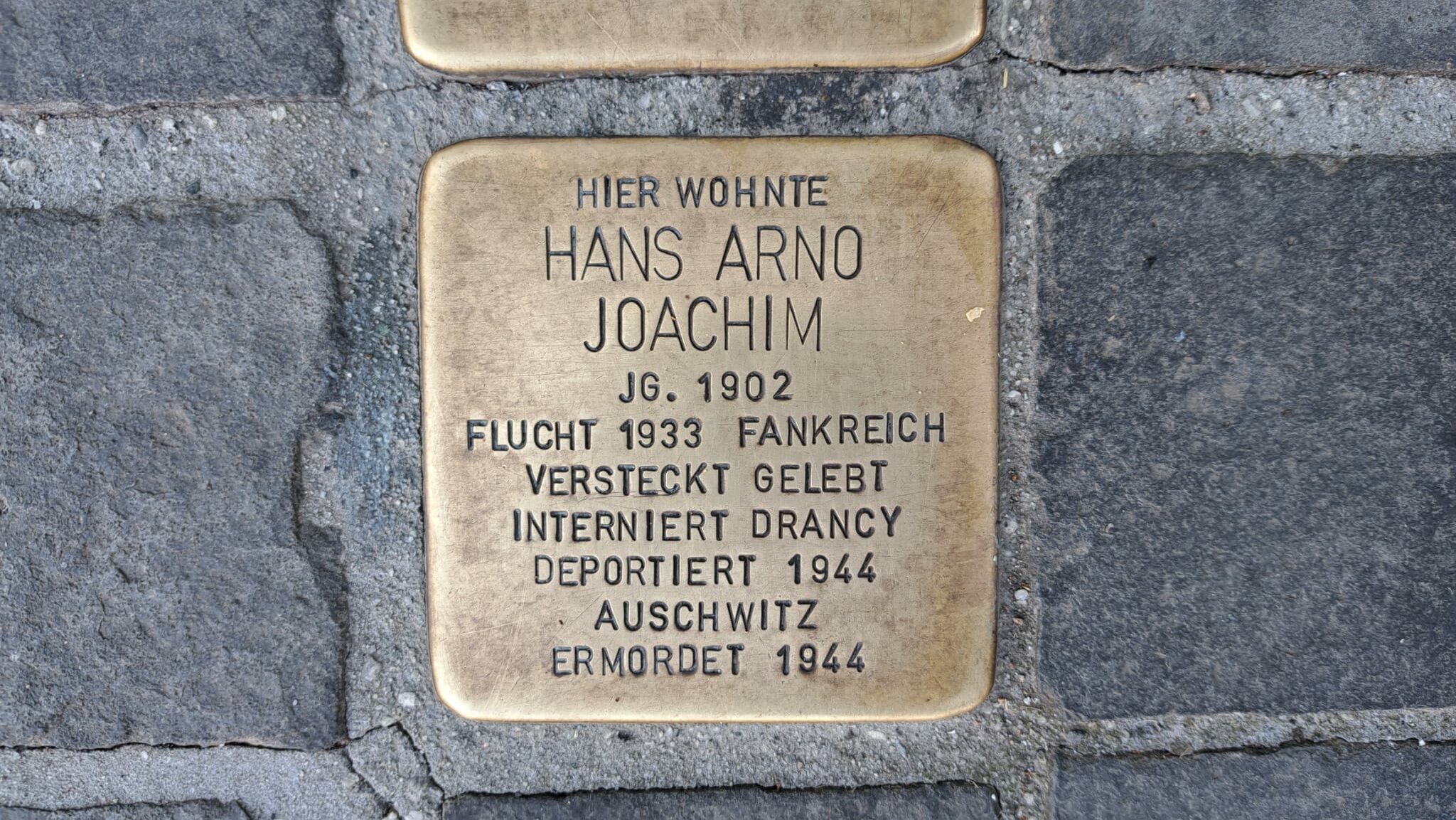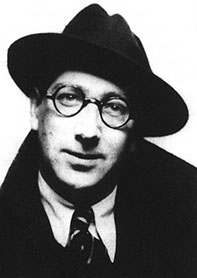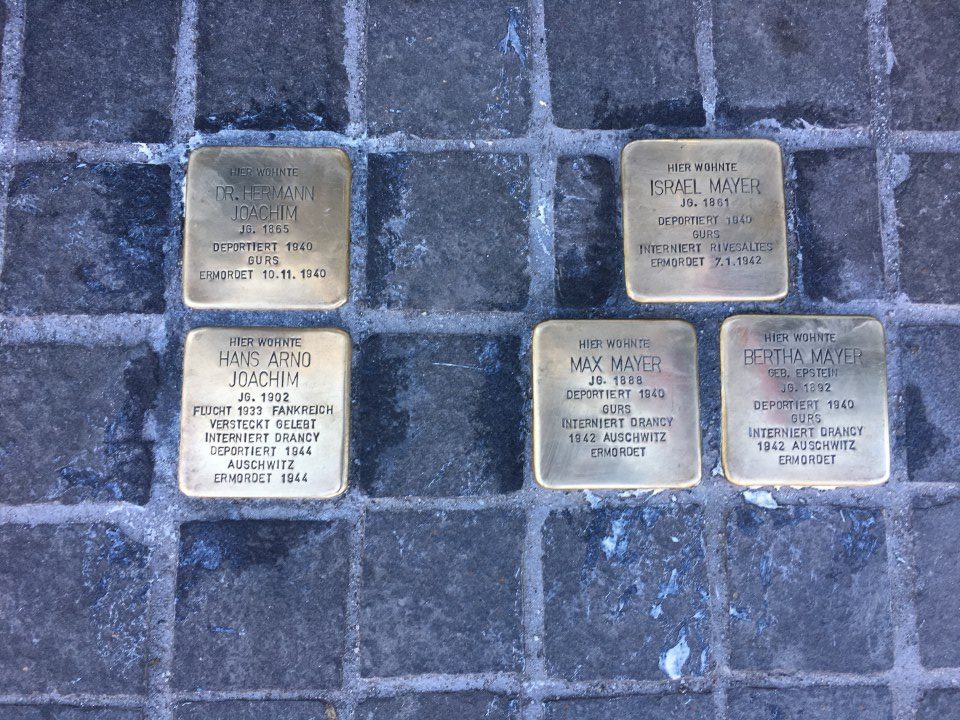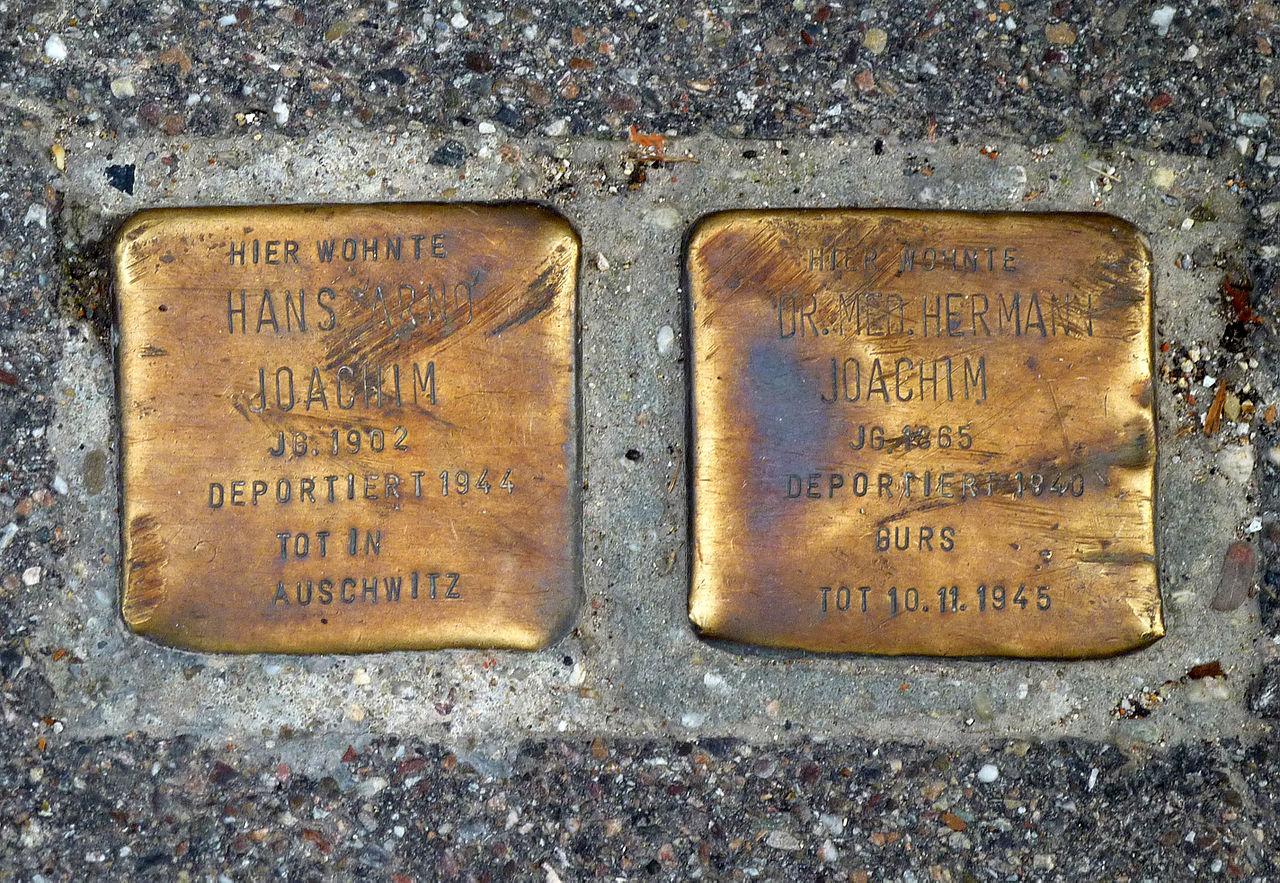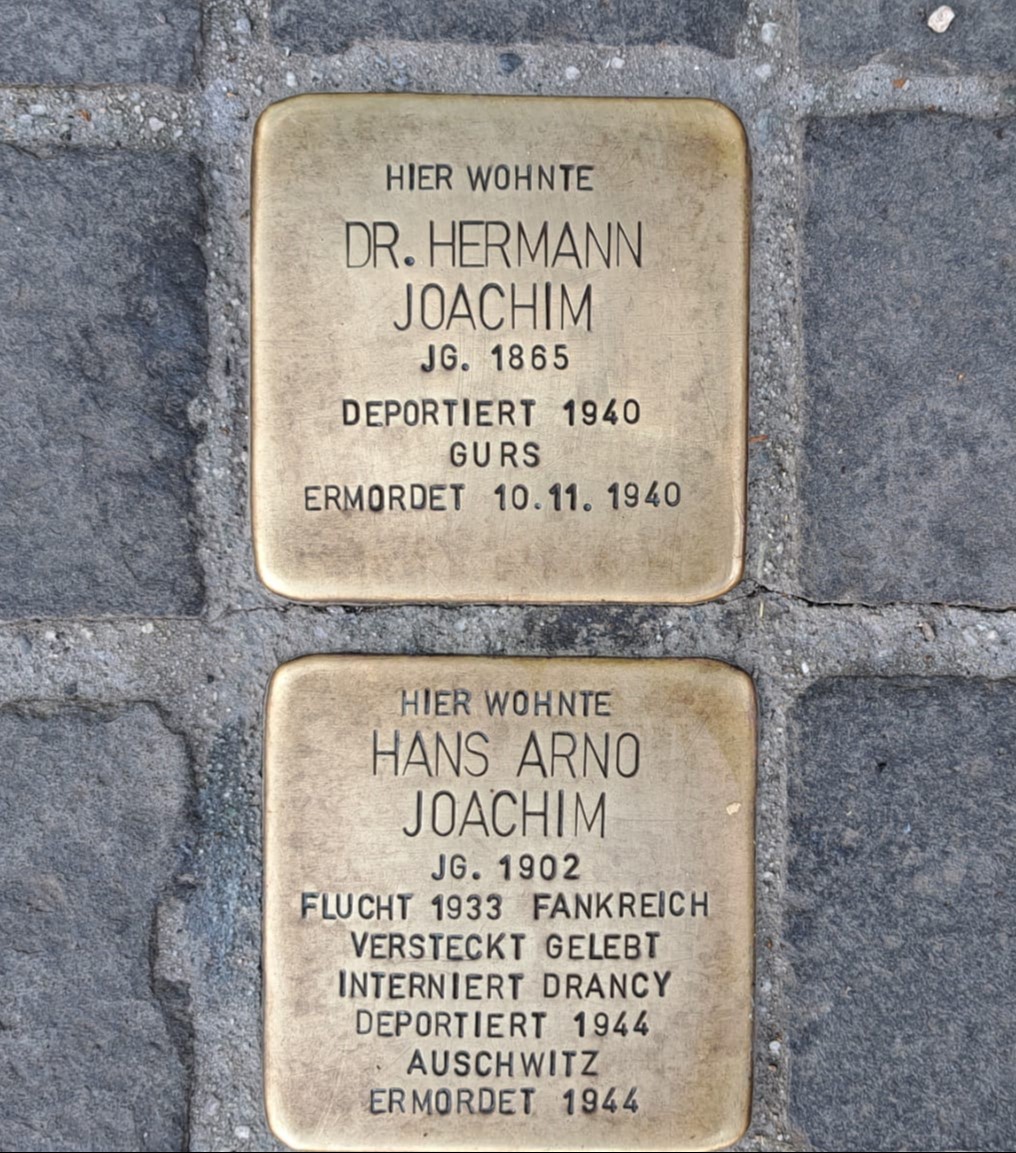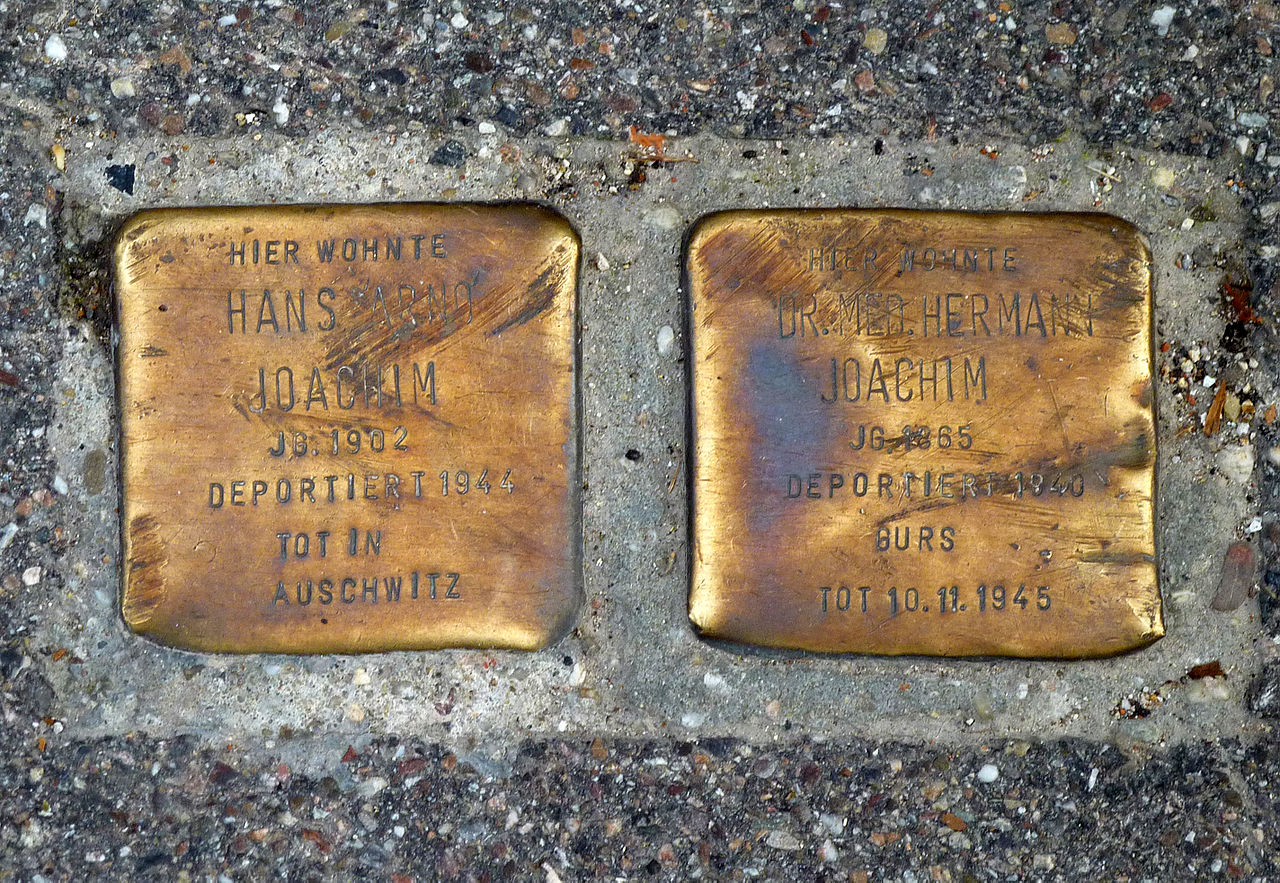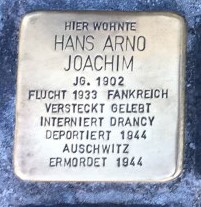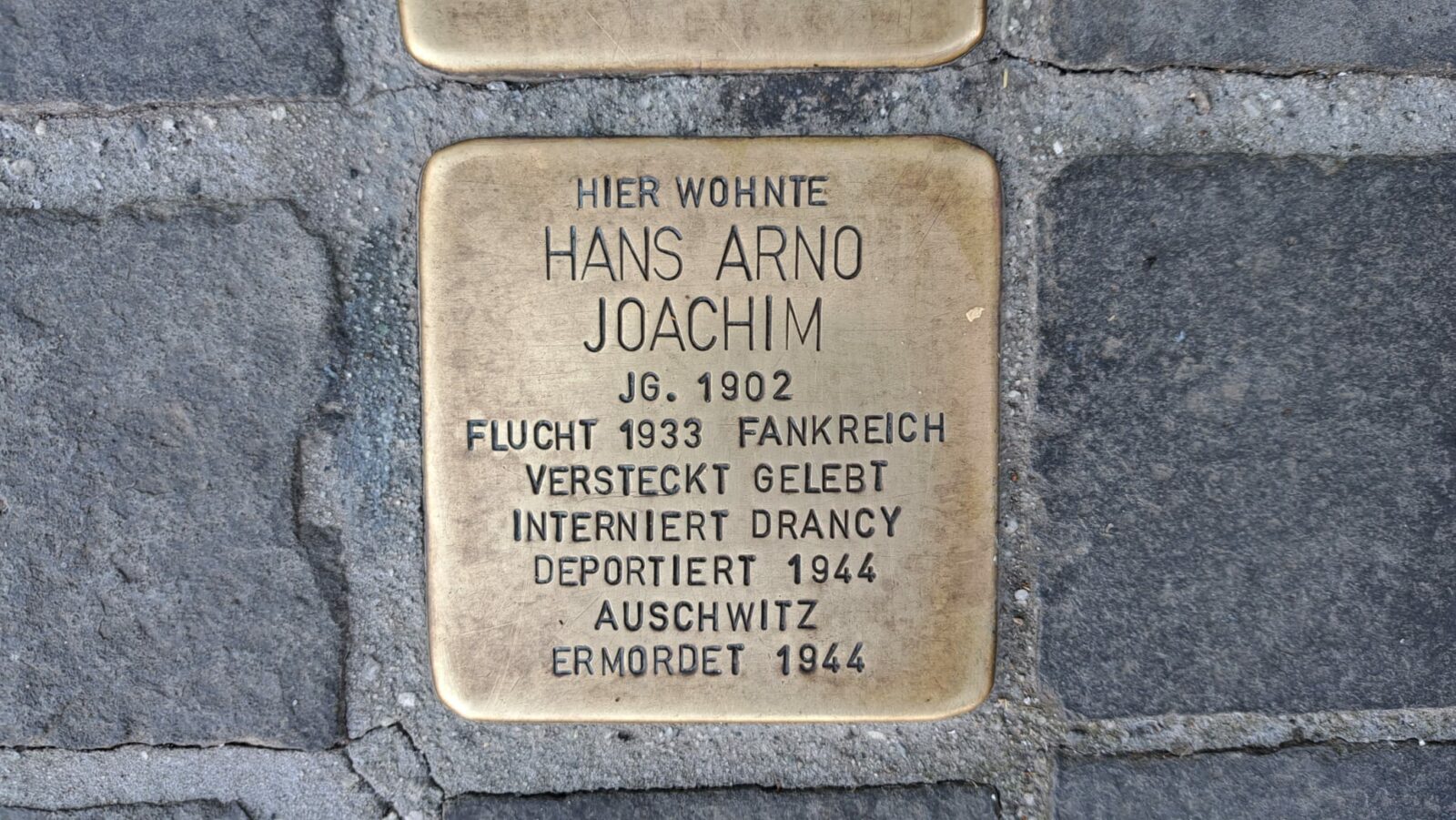
Hans Arno Joachim
HANS ARNO MAX JOACHIM wurde am 3. Mai 1902 in Freiburg geboren. Seine Eltern waren DR. med. HERMANN JOACHIM und Emilie Joachim, geborene Roos. Er hatte einen Bruder, Kurt Karl Joachim, der Medizin studierte. HANS ARNO JOACHIM war Schüler des Bertoldgymnasiums. Die Familie lebte in der Friedrichstraße 26 (heute Friedrichstraße 52) im dritten Stock. Dort wäre er fast während des Luftangriffs auf Freiburg durch ein Luftschiff am Abend des 27. Januar 1916 verschüttet worden (Quelle 64, S. 35).
HANS ARNO JOACHIM studierte mit Unterbrechungen in Freiburg Germanistik, Philosophie und Philologie. Er beschäftigte sich intensiv mit Literatur und war unter anderem befreundet mit Alfred Kantorowicz und Peter Huchel. Er wird als selbstbewusst beschrieben, ohne arrogant oder dünkelhaft gewesen zu sein. Andererseits war er sensibel und hatte, wie eine ehemalige Hausbewohnerin aus der Kindheit, Hannah Ruh, erzählte, „eine zarte, verletzliche Seele“, die er jedoch zu verbergen wusste (Quelle 36, S. 466). Er schrieb Texte und gilt als Erfinder der Hörspiele, versuchte sich als Dramaturg und Literaturkritiker.
In einem Essay schrieb Hans Arno Joachim: „Am Anfang unserer Welt war der Weltkrieg. Und als der Ausnahmezustand des Friedens verhängt wurde, sah man uns in die außerordentliche Lage versetzt, die Welt aufs Neue anzufangen. ( … ]) Wir hatten Ursache, von der Vergangenheit Abstand zu nehmen.“ (ebd., S. 468ff.).
HANS ARNO JOACHIM floh 1933 nach Paris, zusammen mit seiner Frau Gerta Joachim. Dort versuchten sie eine Weile, mehr schlecht als recht zu leben. Mit Kriegsbeginn wurde er als Deutscher in Frankreich – wie alle „feindlichen Ausländer“ – interniert. Gerta Joachim jedoch ließ man fliehen. HANS ARNO JOACHIM lebte in dem kleinen südfranzösischen Küstenort Sanary, wie viele Flüchtlinge. Es gab kaum Visa für eine Ausreise, aber viele Razzien. Er verfügte über Kontakte in die USA und hoffte lange Zeit, dass ihn und seine Frau die Aufenthaltsgenehmigungen, sogenannte Affidavits, noch rechtzeitig erreichten. Sein letzter Brief vom 1. Mai 1941 schließt: „Die Hoffnung, die ich mir hier nicht mehr leisten kann und die zum nackten Leben notwendig wäre, ist mit Dir abgefahren, lieber Alfred (Kantorowicz, M.M.). Ich umarme Euch. Jo“ (ebd., S. 473).
HANS ARNO JOACHIM ist am 15. Februar 1944 in das Gefangenenlager Brignoles (Var) eingeliefert und von dort am 13. März 1944 in das KZ Drancy deportiert worden (ebd.). Mit dem Konvoi Nr. 70 vom 27. März 1944 ist er in das KZ Auschwitz deportiert worden. Dort ist er im Alter von 42 Jahren ermordet worden.
Der sich deiner erinnert, mein Gott
Zu Freiburg einer Stadt, welche gelegen ist an drei Quellen
Und nun mehr ein Fremdling geworden ist
im Lande Deutschland
wie seine Großväter waren in Ägypten und
seine Väter in Babylon.
Hans Aron Joachim, Schriftsteller
Wahrscheinlich unterschrieb HANS ARNO JOACHIM dieses Gedicht bewusst mit dem Namen ,Aron‘ (Fährmann in die Unterwelt, M.M.) vor seiner Flucht 1933 aus Nazi-Deutschland. Offiziell heißt es, er sei verschollen.
Auf HANS ARNO JOACHM sind wir durch den Freiburger Stadtrat und Rechtsanwalt Michael Moos aufmerksam gemacht worden, der auch seinen STOLPERSTEIN finanziert hat.
HANS ARNO MAX JOACHIM was born in Freiburg on May 3, 1902. His parents were HERMANN JOACHIM, MD, and Emilie Joachim, born Roos. He had one brother, Kurt Karl Joachim, who studied medicine. HANS ARNO JOACHIM was a student at the Bertoldgymnasium. The family lived at Friedrichstraße 26 (now Friedrichstraße 52) on the third floor. He was almost buried there during the air raid on Freiburg by an airship, on the evening of January 27th, 1916 (Source 64, p. 35). HANS ARNO JOACHIM studied German, philosophy and philology in Freiburg with interruptions. He was intensively involved with literature and was among others, friends with Alfred Kantorowicz and Peter Huchel. He is described as self-confident without being arrogant or conceited. On the other hand, he was sensitive and had, as a former childhood housemate, Hannah Ruh, recounted, “ a tender, vulnerable soul „, which he nevertheless knew how to conceal (Source 36, p. 466). He wrote texts and is considered the inventor of radio plays, tried his hand as a dramaturge and literary critic. In an essay, HANS ARNO JOACHIM wrote: „A t the beginning of our world was the world war. And when the state of emergency of peace was declared, we were put in the extraordinary position of starting the world anew. ( … ]) We had reason to distance ourselves from the past .“ (ibid., p. 468ff.).
HANS ARNO JOACHIM fled to Paris in 1933, together with his wife Gerta Joachim. There they tried for a while to live more badly than well. At the beginning of the war, he was – being a German- interned in France – like all „enemy aliens“. Gerta Joachim, however, was allowed to flee. HANS ARNO JOACHIM lived in the small southern French coastal town of Sanary, like many refugees. There were hardly any visas for leaving the country, but there were many raids. He had contacts in the USA and hoped for a long time that the residence permits, so-called affidavits, would reach him and his wife in time. His last letter of May 1st 1941 concludes: „Hope, which I can no longer afford here and which would be necessary for bare living, has departed with you, dear Alfred (Kantorowicz, MM). I embrace you. Jo“ ( ibid. , p. 473).
HANS ARNO JOACHIM was sent to the prison camp in Brignoles (Var) on February 15th, 1944 and deported from there to the Drancy concentration camp on March 13th 1944 (ibid.). He was deported to the Auschwitz concentration camp with convoy no. 70 on March 27th 1944. There he was murdered at the age of 42.
Who remembers you, my God
To Freiburg, a city which is situated at three springs
And has now become a stranger
in the land of Germany
as his grandfathers were in Egypt and
and his fathers in Babylon.
Hans Aron Joachim, writer
HANS ARNO JOACHIM probably deliberately signed this poem with the name ‚Aron‘ (Ferryman to the Underworld, MM) before his escape from Nazi Germany in 1933. Officially it is said that he disappeared. HANS ARNO JOACHIM was brought to our attention by the Freiburg councilor and lawyer Michael Moos, who also financed his STOLPERSTEIN.
האנס ארנו מקס יואכים נולד בפרייבורג ב3 במאי 1902. הוריו היו הרמן יואכי ם, MD, ואמילי יואכים (לבית רוס). היה לו אח אחד, קורט קארל יואכים, שלמד רפואה. האנס ארנו יואכים היה תלמיד בBertoldgymnasium. המשפחה גרה ברחוב Friedrichstraße 26 (כיום Friedrichstraße 52) בקומה השלישית. הוא כמעט נקבר בזמן המתקפה האווירית על פרייבורג על ידי ספינות אוויר בערב ה27 בינואר 1916. האנס ארנו יואכים למד גרמנית, פילוסופיה ופילולוגיה בפרייבורג (עם הפרעות). הוא היה מעורב בספרות באופן פעיל והיה חבר של Alfred Kantorowicz וPeter Huchel בין היתר. הוא מתואר כבעל ביטחון עצמי אך לא יהיר או מתנשא. מצד שני, הוא היה רגיש, והייתה לו, כפי שסיפרה חברת ילדות לשעבר, חנה רוח : „נפש רכה ופגיעה“ שבכל זאת הוא ידע איך להסתיר. הוא כתב טקסטים ונחשב לממציא מכשירי הרדיו, וניסה את מזלו כדרמטורג וכ מדרג ספרות. בחיבור, האנס ארנו יואכים כתב: „בתחילת העולם שלנו הייתה את מלחמת העולם … ם מחדש. (…) הייתה לנו סיבה להרחיק את עצמינו מהעבר.“
האנס ארנו יואכים ברח לפריז ב1933, יחד עם אשתו גרטה יואכים. שם הם ניסו במשך זמן מה לחיות יותר רע מאשר טוב. בתחילת המלחמה, הוא נכלא בצרפת בתור גרמני – כמו כל „האויבים הזרים“. גרטה יואכים, לעומת זאת, הורשתה לברוח. האנס ארנו יואכים חי בעיירת חוף קטנה בדרום צרפת (בשם סנרי), כמו פליטים רבים. בקושי היו ויזות כדי לעזוב את המדינה, אבל היו פשיטות רבות. הוא יצר קשר עם ארה“ב וקיווה במשך זמן רב שאשרות השהייה/תושבות, הaffidavits, יג יעו אליו ואל אשתו בזמן. המכתב האחרון שלו מה1 במאי 1941 מסתכם עם: „התקווה, ששוה, אני כבר לא יכול להרשות לעצמי כאן ושתהיה הכרחית לקיום חיים, הלכה יחד איתך, אלפרד היקר (קנטורוויץ, MM). חיבוק, ג’ו
רש משם למחנה הריכוז דראנסי במרץ 1944. הוא גורש למחנה הריכוז אושוויץ במשלוח מספר 70 ב27 במרץ 1944, שם הוא נרצח בגיל 42.
מי זוכר אותך, אלוהים
לפרייבורג, עיר שממוקמת בשלושה מעיינות
ועכשיו נ הפכה לזרה
באדמת גרמניה
כמו שסביו היו במצרים ו
אבותיו בבבל
האנס ארנו יואכים, סופר
האנס ארנו יואכים ככל הנראה חתם על השיר הזה תחת השם „ארון“ (מעבורת לעול ם התחתון, MM) לפני בריחתו מגרמניה הנאצית ב1933. רשמית נאמר שהוא נעלם. האנס ארנו יואכים הובא לידיעתינו על ידי חבר מועצת פרייבורג ועורך הדי ן מיכאל מוס, שגם מימן את אבן הנגף (stumbling block) לזכרו.
אבן נגף לזכר האנס ארנו יואכים הונחה באפריל 2003.

